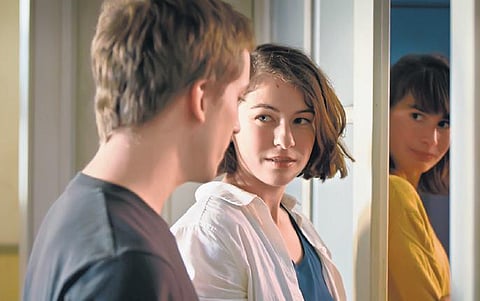

A spider crawls on Lisa’s (Liliane Amuat) back and Mara (Henriette Confurius) creates uninterrupted surface from Lisa’s back, her shoulders, her clothes to Mara’s hand.
They exchange the spider hand to hand in smooth, lyrical motions and then transfer it back on the wall.
It’s the new Zürcher brothers’ film, Das Mädchen und die Spinne or The Girl and the Spider, premiering at the 71st Berlin International Film Festival.
And just like this smooth transition of movements and energies where there would otherwise be chaos, the brothers craft another tale within interiors (like their earlier feature The Strange Little Cat) with abundant chaotic forces at play but with filmmaking that is fluid and always in control, showing a lot and trusting us to take in little by little.
A sensuous, tantalising symphony in one uninterrupted act. Lisa and Mara are roommates in remission. Lisa is moving out to live by herself and there is elaborate work going on for this purpose with multiple people involved.
At first, The Girl and the Spider can be confusing without being disorienting with its ensemble, but this is a feature. The Zürcher brothers film entirely in closed spaces, not claustrophobic, but with a visual palette and structure that gives everyone their own arcs and silhouettes. There is Astrid (Ursina Lardi), Lisa’s mother who is attracted to the handyman.
A neighbour joins in to introduce herself and her children along with her dog and a cat. Mara is aloof and is the only one not helping with any chore. She falls somewhere between rude and insensitive on the spectrum, both to friends and strangers.
She talks about her herpes and the blister in her lips, adding a joke about giving it to Lisa. The first thing we see in the film is a floor plan and Mara mentions the printout being all scrunched up and indecipherable. Lisa points out that it was a PDF and Mara’s story doesn’t fly and we get that the film is a little bit like that for the audience.
A crumbled set of characters intermingle over two locations Lisa’s new home and her old house — and it is up to us to make out whose i’s are dotted and whose t’s are crossed as the filmmakers gradually unravel the picture.
And Mara does have a thing for stories. She tells anecdotes from her childhood or drops random factoids, apocryphal or not, she and only she could tell.
She has a way with words and Confurius has a way with her expressions conveying both detachment and blandishments in equal measure. Spiders and flies are part of her stories, and cats and dogs are part of Zürcher brothers’ ensemble. Mara also has a penchant for breaking things. She could be broken herself.
The neighbour Kerstin (Dagna Litzenberger-Vinet) jokes that maybe it is traumatised by her roommate “queen of the night” Nora’s (Lea Draeger) underwear.
The colours too mix and match, warm colours of yellow and red coexist with the duller ones. Lisa and Mara appear to dress in opposites, a white and a red or a grey and a yellow.
Everyone is identifiable and hyper-focused but nothing in the background is scrunched, the frame marks everybody out in clear terms. The characters dance in and out, one leaves the mark for another to occupy, a story of one relationship ends and another begins.
True to its form, the film plays out like a waltz to create that intoxicated effect. Eugen Doga’s Gramafon plays in key moments as the brothers block the actors in symmetry so that we can see what’s happening in multiple locations spread deep into the frame Lisa’s old home, the neighbours and the children running in the hallway and s tairs throwing water balloons on the residents.
Diegetic sound, noise, the waltz, and music create mood and tension elevating The Girl and the Spider to the stature of a minor classic thanks to the choices it makes in populating the canvas.
It’s a doubly rewarding experience to go in without knowledge of the plot (open secret: one doesn’t exist) and just watch the Zürchers embolden the magnetism of their characters, the film itself a force of nature that holds all of them in a small space and doesn’t let any of them out of its view. Or ours.
The writer discusses Das Mädchen und die Spinne (The Girl and the Spider), that premiered at the 71st Berlin International Film Festival